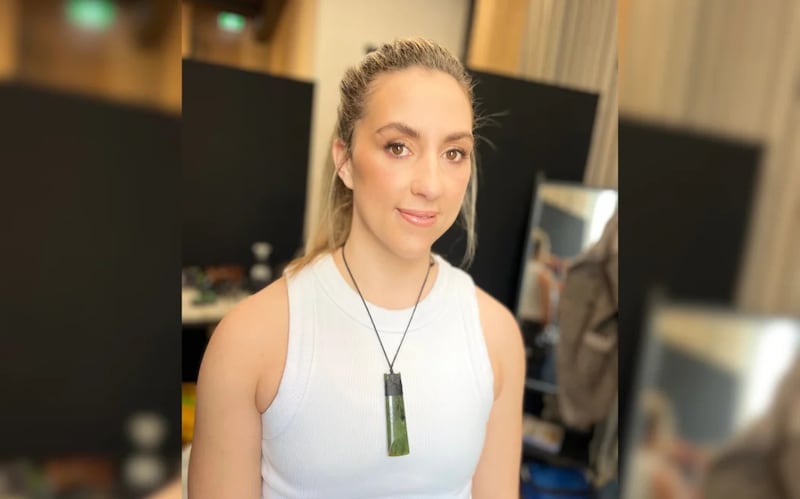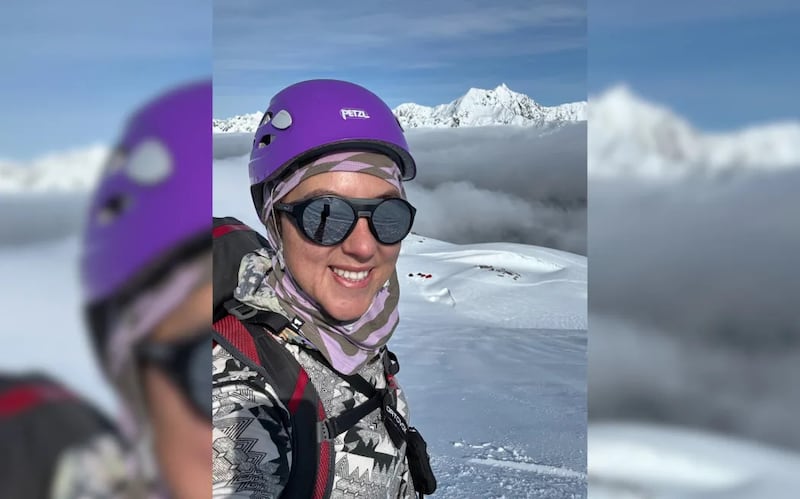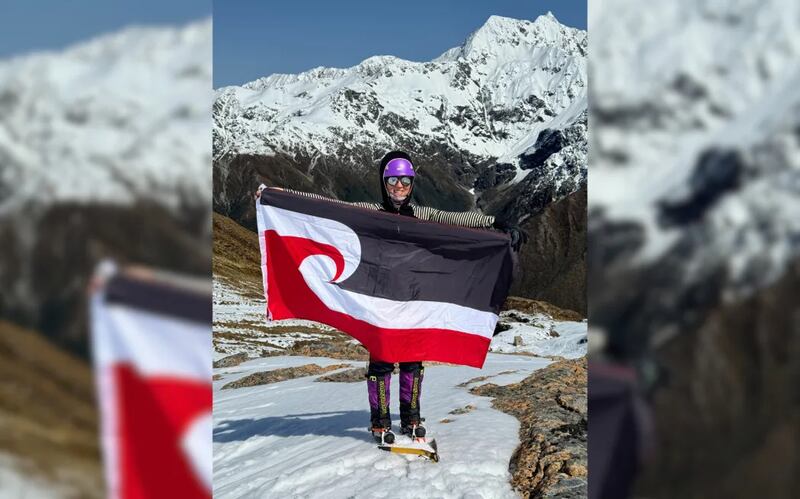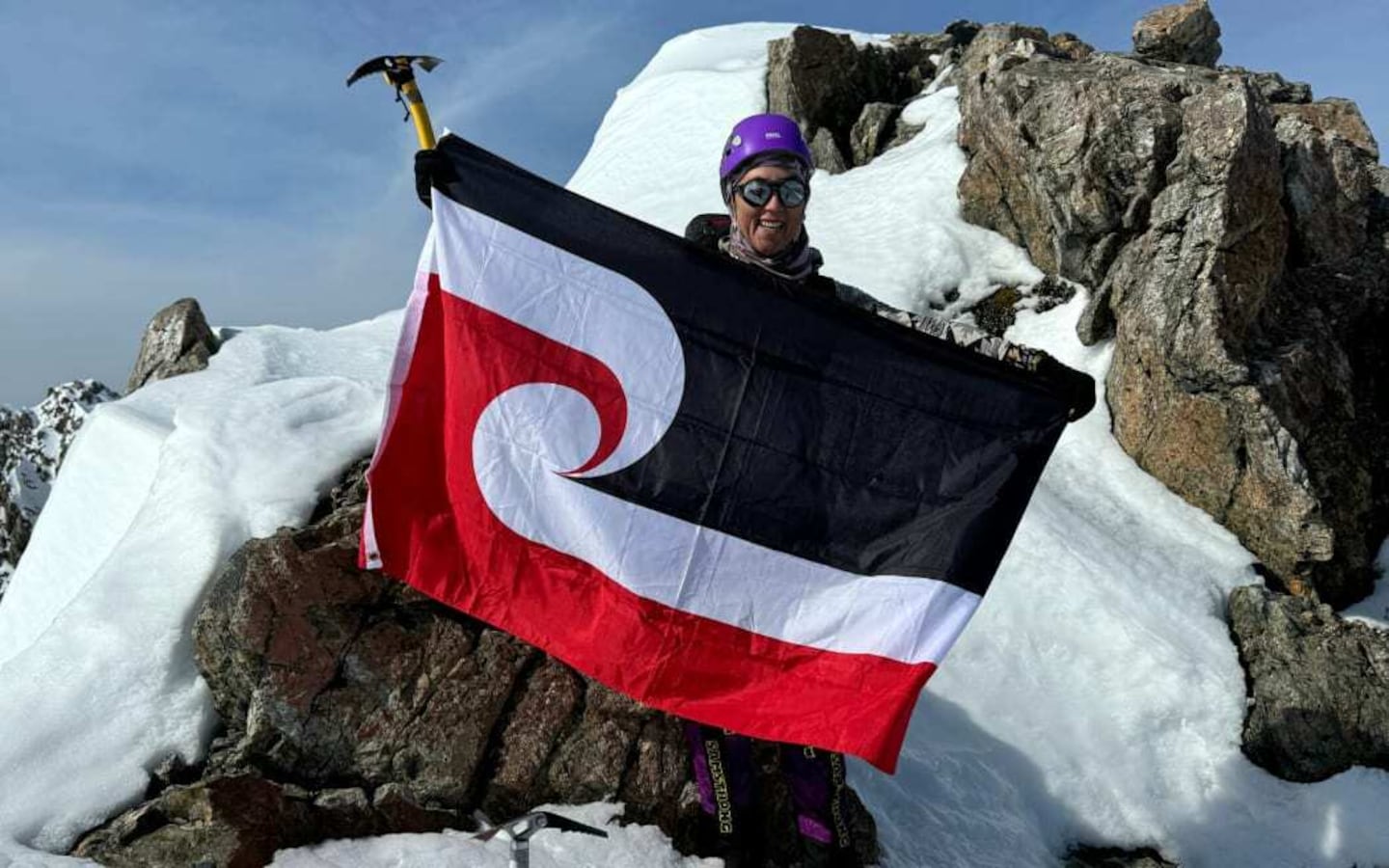This article was first published by RNZ.
Content warning: This story discusses alcohol, drugs, sexual abuse, and suicide
After overcoming years of addiction, Holly Beckman (Ngāpuhi, Ngāti Rangi) aims to be the first wahine Māori to reach the Mt Everest summit.
Beckman’s life did not have an easy start. From the age of 12, she began experimenting with drugs and alcohol to cope with early childhood and intergenerational trauma.
Little did she know that first drink with her nana would lead to 19 years of escaping reality.
“It slowly escalated from alcohol, then marijuana, then it got heavier.”
Struck by the loss of her father in her early years, she lost her connection to all things Māori. She also endured childhood sexual abuse, multiple suicide attempts which led to borderline personality disorder (BPD), depression and PTSD.
Beckman recalls the life-changing moment that got her out of the dark hole. While she was two weeks clean in rehab, she tried to take her life again.
“I was laying on my bed [after the incident] and I could feel the wairua slipping out of me. My energy was depleting, fading, and I thought this is the time that I go.”
But it was also the turning point.

“I thought, if this is the end, what could I have done differently, what could’ve actually saved Holly, or little Holly?”
“Then I thought what if someone actually told their story, so it didn’t make me feel so alone, because all I ever felt was alone.”
That is when her tūpuna guided her to mental clarity giving her the drive to help little Holly and other little Hollys out there, she said.
The start of her dream life
Once she finished nine months of rehab, she Googled ‘How to make documentaries’, and South Seas Film School popped up.
She enrolled and while still a student, created her first documentary: He Ara Anō - a reconnection story of two sisters in recovery.
Beckman, now five-and-a-half years sober and five years in the film industry, leans towards making documentaries on people she met in recovery.
Soon she will turn the camera to herself in an attempt to document her planned Mt Everest (8848m) climb while carrying the Tino Rangatiratanga haki (flag).
“My main motivation is just to see that flag at the top.”
She has not always been a climber. While working on a film job at Mueller Hut (Aoraki), she met a New Zealand guide by the name of Lydia Bradey - the first woman in the world to summit Mt Everest without supplementary oxygen.
Beckman admits she did not know who she was in the beginning.
“We were talking about has there been any Māori go up to Everest and she said Mark Whetu, but there hasn’t been a wahine [Māori] yet. And as soon as she said that I just got goose bumps and said that’s me.”
Similarly, Matawhero Lloyd (Ngā Ariki Kaipūtahi) carried the haki to Base Camp this year and put a wero (challenge) out to Māori to carry it to the summit. Beckman aims to be that person.

But where does someone start if they have next to no mountaineering experience?
Beckman did a beginners course, then she climbed Tititea/Mt Aspiring (3033m), guided by Bradey while documenting their journey in a four-part series - Te Ara.
“I know why she’s the best in the world now, and she could get anybody up a mountain. She’s the best of the best.”
The pair aim to document the Everest expedition and have started a Givealittle to help fund it.
“Holly, I believe could climb Mt Everest because look at where she has come from,” Bradey said.
“I think she has the ability to be motivated to [climb Everest] It gives her the tools to grit her teeth that a lot of people don’t have.”
Bradey made history in 1988 when she became the first woman in the world to climb Everest without supplementary oxygen.
On the climb up, 100m from the summit, she had questioned whether she had enough in the tank to make the summit and safely descend.
But, once she reached the summit she felt “hugely relieved.” She could now focus on getting down.
Back in the day she had no extra oxygen, there were no fixed ropes, radios, or sherpas, and when orographic clouds set in, visibility becomes an issue. Now there is that as well as weather apps, and wi-fi at the base camp.
Bradey has now climbed the mountain six times - more than any other woman.
To prepare for climbing Everest takes a huge commitment of time and money.
For non-climbers, climbing up in altitude is like working out in the gym and only being able to do two reps max, Bradey said. Therefore, acclimatisation training is a must.

An attempt on Everest itself is still in Beckman’s future and also depends on funding and timing - the main climbing season runs in April and May each year.
On Tuesday Beckman departs for Nepal to climb three Himalayan peaks: Lobuche East (6145m), Island Peak (6189m) and Mera Peak (6476m) with local guides. But this time, Bradey will not be with her.
It will also be her first time climbing peaks over Mt Aspiring’s 3033m.
Beckman said it is a mental game at this point.
“I’m going to have to pull from any sort of resource like, look at the time I was about to kill myself.
“I’m going to have to really think about those times and think about why I’m doing this to get me up that hill.”
IF YOU NEED HELP
Helplines provide free confidential support if you want to talk about your own, or someone else’s alcohol or drug use.
Narcotics Anonymous: 0800 628 632
Alcohol & Drug Helpline: 0800 787 797
Or free text: 8681
Māori Helpline: 0800 787 798
Pasifika Helpline: 0800 787 799
Youth Line: 0800 787 984
Suicide Crisis Helpline - 0508 828 865 (0508 TAUTOKO).
Lifeline - 0800 543 354 (0800 LIFELINE)
Or free text 4357 (HELP).
Youthline - 0800 376 633
Free text 234
Or email talk@youthline.co.nz
Samaritans - 0800 726 666
- RNZ


